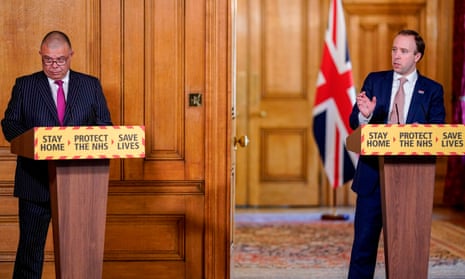That’s it from the UK coronavirus liveblog today. Please do follow the 24-hour global coronavirus liveblog for further updates - we’ll be back with you early tomorrow morning.
UK coronavirus live: Hancock says human vaccine trials start this week as death toll rises by 823 - as it happened
UK hospital deaths up to 17,337; MPs vote for virtual parliament sessions; Boris Johnson speaks to Trump
Tue 21 Apr 2020 15.39 EDT
First published on Tue 21 Apr 2020 02.36 EDT- Summary
- Matt Hancock's press conference - Summary
- Nightingale hospital turns away dozens of Covid-19 patients
- Hancock dismisses claim staying out of EU ventilator scheme was political decision
- Hancock says Oxford team to start vaccine trials on humans from Thursday
- Matt Hancock's press conference
- Northern Ireland records nine deaths in the last 24 hours
- Starmer claims there is 'increasing gap' between government claims on PPE and reality
- Staying out of EU ventilator scheme was 'political decision', not email error, says Foreign Office chief
- UK hospital coronavirus deaths rise by 823 to 17,337
- MPs vote to bring in 'hybrid' proceedings, with most members participating remotely, from tomorrow
- Allowing Speaker to prevent MPs from entering Commons chamber would be 'outrageous', says Tory
- Coronavirus deaths in England and Wales peaked on 8 April, experts claim
- Tory MP says it's 'shocking' parliament has not yet had chance to debate social distancing rules
- MPs start debate on motion to move to mostly virtual means of operating
- Coronavirus hospital death figure for England rises by 778
- Wales reports 25 new deaths, bringing its total to 609
- One in five UK adults expect to apply for benefits
- Johnson to speak to Trump today about coronavirus - although No 10 denies he's back at work
- Scotland records 70 new deaths from Covid-19, taking total to 985
- ONS to investigate why 8,000 weekly 'excess' death toll even higher than coronavirus figures imply
- Latest ONS figures show 20% of coronavirus deaths occurring outside hospital
- Agenda for the day
- Commons Speaker urges MPs to stay at home as parliament moves towards remote working
- Primark furloughed 68,000 staff across Europe
- Shortage of PPE 'a disgrace', says Labour
- Summary of the morning
Live feed
- Summary
- Matt Hancock's press conference - Summary
- Nightingale hospital turns away dozens of Covid-19 patients
- Hancock dismisses claim staying out of EU ventilator scheme was political decision
- Hancock says Oxford team to start vaccine trials on humans from Thursday
- Matt Hancock's press conference
- Northern Ireland records nine deaths in the last 24 hours
- Starmer claims there is 'increasing gap' between government claims on PPE and reality
- Staying out of EU ventilator scheme was 'political decision', not email error, says Foreign Office chief
- UK hospital coronavirus deaths rise by 823 to 17,337
- MPs vote to bring in 'hybrid' proceedings, with most members participating remotely, from tomorrow
- Allowing Speaker to prevent MPs from entering Commons chamber would be 'outrageous', says Tory
- Coronavirus deaths in England and Wales peaked on 8 April, experts claim
- Tory MP says it's 'shocking' parliament has not yet had chance to debate social distancing rules
- MPs start debate on motion to move to mostly virtual means of operating
- Coronavirus hospital death figure for England rises by 778
- Wales reports 25 new deaths, bringing its total to 609
- One in five UK adults expect to apply for benefits
- Johnson to speak to Trump today about coronavirus - although No 10 denies he's back at work
- Scotland records 70 new deaths from Covid-19, taking total to 985
- ONS to investigate why 8,000 weekly 'excess' death toll even higher than coronavirus figures imply
- Latest ONS figures show 20% of coronavirus deaths occurring outside hospital
- Agenda for the day
- Commons Speaker urges MPs to stay at home as parliament moves towards remote working
- Primark furloughed 68,000 staff across Europe
- Shortage of PPE 'a disgrace', says Labour
- Summary of the morning
Summary
Government denies it took political decision to stay out of EU ventilator scheme
The health secretary Matt Hancock has denied that UK ministers took a political decision not to be involved in an EU ventilator scheme, contradicting a statement from the Foreign Office permanent under-secretary Sir Simon McDonald, earlier in the day. The government has previously said the UK did not take part due to missed emails.
Trials for a coronavirus vaccine to start on people in Oxford on Thursday, says government
A potential coronavirus vaccine being developed at the University of Oxford will be trialled on people from Thursday, said the health secretary Matt Hancock. Hancock added that he was making £22m available to Imperial to support their ongoing phase two trials, and providing £20m to the Oxford team to accelerate their trials.
UK hospital coronavirus deaths rise by 823 to 17,337
The Department for Health and Social Care has published the latest UK hospital death figures: 823 new deaths were recorded, taking the total to 17,337.
Coronavirus deaths in England and Wales peaked on 8 April, experts claim
The peak in the number of coronavirus deaths in England and Wales happened on April 8, according to scientists
ONS to investigate why 8,000 weekly ‘excess’ death toll even higher than coronavirus figures imply
Nick Stripe, the health analysis and life events division at the ONS, said new ONS figures showed around 8,000 “excess deaths” in the week ending 10 April. The figures revealed that deaths were at the highest level for 20 years, and double the level normally expected.
Latest ONS figures show 20% of coronavirus deaths occurring outside hospital
In the week ending 10 April only 80.3% of coronavirus deaths took place in hospital, with the rest occurring in care homes, private homes and hospices. The ONS figures also revealed that the number of deaths in care homes in that week was double what it was just four weeks before.
Dozens of patients with Covid-19 have been turned away from the NHS Nightingale hospital in London because it has too few nurses
A Guardian exclusive has revealed that dozens of patients with Covid-19 have been turned away from the NHS Nightingale hospital in London because it has too few nurses to treat them.
Labour: there is ‘increasing gap’ between government claims on PPE and reality
Labour leader Keir Starmer said there was a “increasing gap” between what the government was stating and what was being reported on the frontline. Earlier the shadow Cabinet Office minister Rachel Reeves said the shortage of personal protective equipment was a “disgrace.
Matt Hancock's press conference - Summary

Here are the main points from Matt Hancock’s press conference.
- Hancock, the health secretary, said an Oxford team working on a coronavirus vaccine would begin trials on humans on Thursday. He said:
I can announce that the vaccine from the Oxford project will be trialled in people from this Thursday. In normal times, reaching this stage would take years and I’m very proud of the work taken so far.
At the same time, we will invest in manufacturing capability so that if either of these vaccines safely work, we can make it available for the British people as soon as humanely possible.
Hancock also announced that the Oxford University project will get £20m to fund its trials. Another project based at Imperial College London will get £22.5m to support its phase two clinical trials, he said. He said he was determined to back the researchers “to the hilt”. He went on:
After all, the upside of being the first country in the world to develop a successful vaccine is so huge that I am throwing everything at it.
- Hancock dismissed a claim from the most senior official at the Foreign Office that the government took a political decision not to participate in an EU-wide ventilator procurement scheme. Asked about Sir Simon McDonald’s comment (see 4.17pm), Hancock said:
I haven’t seen that exchange but I have spoken to the foreign secretary and as far as I’m aware there was no political decision not to participate in that scheme.
We did receive an invitation in the Department of Health and it was put up to me to be asked and we joined so we are now members of that scheme.
However, as far as I know that scheme hasn’t [provided] a single item of PPE [personal protective equipment].
Although Hancock’s comment sounded like a robust denial, it was less than watertight because Hancock just said he was “not aware” of any political decision to boycott the scheme and he then conflated the EU ventilator procurement scheme with a separate one covering PPE (although, as Jennifer Rankin wrote when she first reported on this in March, the original UK decision not to get involved covered all the various EU coronavirus procurement schemes.)
- Prof Jonathan Van-Tam, the deputy chief medical officer for England, hinted that the government is not about to change its policy on members of the public wearing masks. The government’s scientific advisory group for emergencies, Sage, discussed this today, but no new recommendations have gone to ministers yet. Van-Tam said the advice would change if the evidence justified that. But he went on:
There is an absolutely enduring principle here that Sage places great value and prime importance on never jeopardising the supplies of PPE to our health and social care workers. That is a line that we are not going to cross.
- Hancock said the government would start testing NHS staff who do not have coronavirus symptoms.
- Van-Tam said the “vast majority” of coronavirus was being spread by people with symptoms. But there was also likely to be some spread from symptomatic or pre-symptomatic people, he said.
- Hancock said the government was working with 159 UK manufacturers who may be able to make PPE for the NHS. But not all offers were credible, he said.
We have had to make sure we sort out the creditable offers from those that are not.
We have had some offers, for instance, that have come from companies where, upon investigation, the company has only just been formed in the previous day or two before coming and asking for a cash deal with the government.
- Van-Tam said the UK is not yet seeing a significant downturn in new cases. he said:
It isn’t clear there is an enormous downturn at this point. The numbers are varying day to day but they remain high and we remain in a situation of danger that we must take very seriously indeed.
In London the number of hospital cases is declining, after hitting a peak probably on 10 April, he said. But he said in other parts of Britain hospital cases were at “rather more of a plateau”.

Photograph: Andrew Parsons/10 Downing Street/AFP via Getty Images

The number of confirmed cases of Covid-19 in prisons continues to rise.
As MPs heard that more than 4,000 prisoners aged over-50 were in shared cells, Ministry of Justice figures revealed that 287 prisoners had tested positive for the coronavirus across 65 prisons by 5pm on Monday, up 3% in 24 hours.
There are about 81,500 prisoners in England and Wales across 117 prisons. At least 15 prisoners are known to have died from the virus. The number of infected prison staff rose 10% in the same period to 217 across 54 prisons.
The Prison Service is to temporarily release up to 4,000 inmates who are within two months of their release date, as well as building 500 extra cells within the prison estate to increase single-cell occupancy.
However, there have been warnings that 15,000 would need to be released to achieve single-cell occupancy across the estate.
Earlier on Tuesday, the justice committee heard that prisoners aged over 50 were particularly vulnerable to Covid-19. There are currently about 13,700 prisoners aged 50 and over in England and Wales.
Peter Clarke, the chief inspector of prisons, told a remote session of the justice committee:
We’ve looked at some of the data. It is the fact that more older prisoners than from other age groups are held in single-cell accommodation, about 67%. That does mean there’s about a third who are not held in single-cell accommodation. That of course, with current figures, is somewhere over 4,000.
Nightingale hospital turns away dozens of Covid-19 patients
Dozens of patients with Covid-19 have been turned away from the NHS Nightingale hospital in London because it has too few nurses to treat them, according to an exclusive from my colleagues Sarah Marsh and Denis Campbell.
The disclosure comes amid a growing belief among hospital management in the capital that the Nightingale, built to great acclaim over just nine days, is becoming a “white elephant”.
The hospital has been unable to admit about 50 people with the disease and needing “life or death” care since its first patient arrived at the site in London’s Docklands on 7 April. Thirty of these people were rejected because of a lack of staff.
Full story here:

Allowing people to drive to the countryside for exercise causes “untold anxieties” for rural communities fearful of being exposed to a greater risk of coronavirus, rural groups have told the government.
Last week police said guidance from the Crown Prosecution Service meant it was permitted for people to drive to recreation sites, so long as they spent more time walking around than getting there in their cars. In a letter to the justice secretary, Robert Buckland, a coalition of rural groups said this stance needed to change.
The letter is from the National Farmers’ Union, the Countryside Alliance, the Country Land and Business Association and the National Rural Crime Network, whose chair is Julia Mulligan, the police and crime commissioner for North Yorkshire, where police have been stopping drivers at checkpoints.
News stories about nature and wildlife flourishing and air pollution dropping as the lockdown has reduced air and road traffic has left many people keen to retain some benefits.
Some politicians are already talking about how the future could look different – leaders in northern England have urged the government not to return to “business as usual” after the coronavirus lockdown, but to embrace positive changes the measures have led to, such as the drop in UK air pollution, writes my colleague Amy Walker.
Andy Burnham, the mayor of Greater Manchester, and Steve Rotheram, the mayor of Liverpool city region, said building cycling and walking networks in cities and boosting internet connections so that more people could work from home could form part of a strategy to “keep some of the benefits that we’ve been experiencing”.
Hancock says there is a huge amount still to do.
But the UK has met its core goals, he says. He says it has managed to “bend down the curve” in terms of infections, and ensure that the NHS has not been overwhelmed.
And that’s it. The press conference is over.
Q: Yesterday Prof Yvonne Doyle from Public Health England said about 10% of coronavirus deaths were taking place outside hospital. Today the ONS figures show that is much higher. It says government figures could be 40% out. (See 10.50am.) That suggests your plan is not working.
Hancock says that 40% figure is not right. He says one of the slides shown earlier addresses this. (See 5.20pm.)
Hancock says NHS workers should feel free to talk about what is happening at their work. That sort of transparency is important.
Comments (…)
Sign in or create your Guardian account to join the discussion